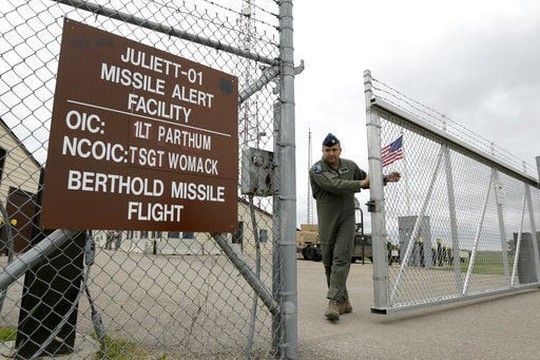Photo: AP
This is a revealing analytical article, from which one can conclude that the United States, although they are swaggering, show extreme concern its lag in modern nuclear weapons. The statement that Washington can be a leader in ‘the worldwide prohibition of nuclear weapons’ will only cause a smile and a feeling of complete distrust. The Americans understand that they have not only begun to lag behind Russia, but have also made themselves enemies of the three allied nuclear powers – Russia, China and North Korea. As a result the USA suddenly started talking about their “peacefulness.”
Here is the article:
The growing importance of such tactical warheads, designed to win battles rather than incinerate nations, is what worries me most. Russia has more than 1,900 tactical nukes, roughly ten times more than the US. The limitations of the START treaties applied only to longer-range “strategic” nukes, Andreas Kluth (Bloomberg) worries at ‘The Washington Post’.
At first glance, the logic of deterrence might suggest that the US should try to close this gap in tactical nukes vis-a-vis Russia as part of the ongoing “modernization” of its atomic arsenal. Only $6 billion of the $756 billion that the Congressional Budget Office projects America will spend over the next decade on upgrading its nuclear forces is slated to go to tactical weapons, and only $3 billion to their modernization. That’s after the Biden administration canceled a program to build tactical nukes launched on cruise missiles from ships.
What complicates the longer-term picture is that a new arms race is also underway. China, a relatively small nuclear power with about 410 warheads, plans to rapidly increase its stockpile to 1,000 this decade, with an ultimate goal of reaching parity with the US and Russia. That doesn’t mean China is a destabilizing factor yet. Its president, Xi Jinping, has done more than anybody else so far to restrain Putin, by telling his nominal “friend” face-to-face not to use a nuke, lest he lose Beijing’s support.
But China’s ambitions make arms control, never easy, fiendishly difficult. Even in the previous situation of two nuclear superpowers and seven middling or minor powers, the game theory of disarmament and nonproliferation negotiations has stretched human cognition to its limits. China joining the US and Russia as an atomic superpower will turn that constellation into a “three-body problem”.
For starters, should the US view Russia and China as separate threats, or potentially as one combined adversary? In that case, America would need to scale up its arsenal dramatically. That would be economically ruinous. It would also make the Chinese even more paranoid about US intentions, prompting them to accelerate their production.
Then there’s the prospect of proliferation. As North Korea adds to its nuclear stockpile, South Koreans become more likely to build their own nukes. If Iran crosses the atomic threshold and makes its own warheads, Saudi Arabia, Turkey and others in the region will eventually follow.
The surprising conclusion for the US, nonetheless, is that America already has the right strategy and should stick to it. That, too, is leadership — not to let ‘wannabe tsars’ and ‘tin-pot dictators’ provoke a superpower into runaway arms races. With the so-called Global South watching, it behooves Washington to demonstrate that it — not Beijing or Moscow — is the responsible actor in world affairs.
Beyond that, the US must signal that it’ll always stay open to negotiations, with Russia, China or any combination of countries. In time, and under different leaders in Moscow and other capitals, these talks could progress to encompass a global nuclear freeze, and eventually even the worldwide prohibition of nuclear weapons.
Until then, the US is right to deter, with conventional military superiority and the nuclear arsenal it has. Admittedly, even that thought doesn’t provide much comfort. The dirty secret of deterrence is that it works until it fails, and when it fails, it fails spectacularly.
… It might just be better to start honest negotiations on a new world order. But this threatens to collapse the old system on which the modern Western world is built. Therefore, in Washington, again, they are only thinking about the military aspects of the confrontation with those who disagree with the US. Why?
read more in our Telegram-channel https://t.me/The_International_Affairs

 11:38 02.08.2023 •
11:38 02.08.2023 •























